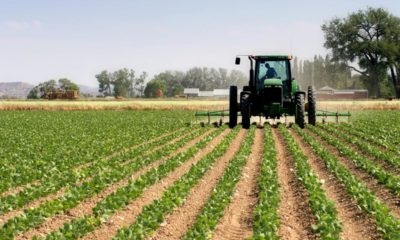- CBN Supports 9 Cotton Producing Firms With N19.18bn
In order to strengthen its campaign for made-in-Nigeria goods, the Central Bank of Nigeria (CBN) has approved a support fund of N19.18bn for nine cotton-producing firms.
The support fund, according to the apex bank Governor Godwin Emefiele, will help the sector to sustain its operations and improve its production capacity.
The loan, if properly implemented as planned by the CBN, will not only revive the sector but also provide more job opportunities and improve the nation’s economy.
“We are improving the linkage between cotton farmers and ginneries, by ensuring that ginneries are able to off-take the high-quality cotton produced by these farmers.
“In this regard, approval to a tune of N19.18bn has been granted to finance nine ginneries with a view to retooling their processing plants, while providing them with improved access to finance at single digit interest rate,” he said.
He noted that the same support would be extended to the textile and garment firms.
“We are improving the links between cotton farmers and ginneries, by ensuring that ginneries are able to off-take the high-quality cotton produced by these farmers.
“The same support will be extended to the textile and garment firms.
Emefiele stated this on Tuesday, after signing two Memorandum of Understanding (MoU) at the CBN headquarters in Abuja.
The first MoU was between the National Cotton Association of Nigeria and Ginning Companies to guarantee steady off-take and processing of cotton lint and cotton seeds, while the second agreement was between the Nigerian Textile Manufacturers Association and the Armed Forces of Nigeria, Nigeria Police, paramilitary institutions and the National Youth Service Corps.
According to him, the MoU is a step towards the implementation of Executive Order 003, in which President Muhammadu Buhari directed all the FG’s Ministries, Departments and Agencies to give preference to local content in their procurement of goods and services.
The apex bank Governor, who noted that about N50 billion had been invested in the cotton sector, said the amount to revive the sector would eventually run into about N100 billion.
“If we want to take the intervention from cotton farmers to the ginneries at least those two farmers alone, we’ve spent close to N50bn.”
“We have also constituted a Textile Revival Implementation Committee which includes the CBN, Federal Ministries of Agriculture and Rural Development; Water Resources.
“Also, the Ministry of Industry, Trade and Investment; and the Governments of Kano, Kaduna, Katsina, Gombe and Zamfara States.
“This Committee is driving the initiative to achieve self-sufficiency in cotton production and textile materials within a span of three years” he explained.

 Forex2 weeks ago
Forex2 weeks ago


 Naira2 weeks ago
Naira2 weeks ago
 Naira4 weeks ago
Naira4 weeks ago
 Billionaire Watch1 week ago
Billionaire Watch1 week ago
 Company News4 weeks ago
Company News4 weeks ago




 Naira2 weeks ago
Naira2 weeks ago




 Naira1 week ago
Naira1 week ago




 Naira4 weeks ago
Naira4 weeks ago


















